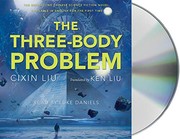The Three Body Problem
I just kept reading to find out what was going on, the book really sucked me into the world and I couldn't stop myself as I had to know what was going on and how this was all connected.

Audio CD
Published Feb. 9, 2015 by Macmillan Audio.
Within the context of the Chinese Cultural Revolution, a military project sends messages to alien worlds. A nearby alien society receives these messages and makes plans to invade Earth.
I just kept reading to find out what was going on, the book really sucked me into the world and I couldn't stop myself as I had to know what was going on and how this was all connected.
A bunch of interesting ideas, but miles away from a great book.
The first few chapters had me darting to and from Wikipedia to help add some context to a story that is deeply set in the Chinese Cultural Revolution. It',s a triviality to call the story complex, a mystery than unfolds through the book. Be warned this is the first in a trilogy and a very much sets itself up this way, which was a little frustrating in the last few chapters.
I'm not thoroughly familiar with science fiction as a genre, but I'd imagine this is pretty quintessential hard science fiction. That means that quite a lot of text throughout the novel is devoted to explaining the scientific realities behind the events of the narrative. For example, entire chapters are devoted more or less to detailing the physical minutiae of how messages might be transmitted between Earth and alien civilizations.
In the case of this novel, hard science fiction also means substantially less attention is given to the development of characters and the drama between them. Indeed, I found the book somewhat reminiscent of my experience with Isaac Asimov, where all the important characters are STEM academics and the only interesting thing they could imagine talking about is science in one form or another. So don't expect a very compelling drama from this novel or particularly deep or complex characters. With …
I'm not thoroughly familiar with science fiction as a genre, but I'd imagine this is pretty quintessential hard science fiction. That means that quite a lot of text throughout the novel is devoted to explaining the scientific realities behind the events of the narrative. For example, entire chapters are devoted more or less to detailing the physical minutiae of how messages might be transmitted between Earth and alien civilizations.
In the case of this novel, hard science fiction also means substantially less attention is given to the development of characters and the drama between them. Indeed, I found the book somewhat reminiscent of my experience with Isaac Asimov, where all the important characters are STEM academics and the only interesting thing they could imagine talking about is science in one form or another. So don't expect a very compelling drama from this novel or particularly deep or complex characters. With maybe one exception (the character Ye Wenjie) the stakes of this narrative are all practical, not emotional or relational.
But there is (in my mind) a very clever plot in here. The author does a great job of leveraging a variety of concepts and technologies from various STEM disciplines as plot points and narrative developments, both breakthroughs and setbacks for the protagonists. There's also a fascinating layer of 20th century Chinese history that overlays and informs the narrative. But this is neither a thriller nor a romance, so don't expect some pulse-pounding climax at the book's end that will leave you breathless.
I have a degree in a STEM field (computer science) so I may be biased in this assessment, but I thought the book was pretty readable insofar as the science is presented and detailed. But detractors are not wrong to call the writing in general both dry and wooden. I can't tell if it's a authentic reflection of the original author's personal style or perhaps indicative of Chinese prose generally, but in either case this book's writing is far from poetic.
Bottom line, if people are uncertain that they'll be able to get through this book, the only advice I can offer is this: if & when you find yourself struggling to get through a heavy passage detailing scientific minutiae, not only is the novel not going to "get better" from there, but passages such as those are themselves a great part of why this book's fans love it so much. So pull that ripcord early if you find yourself struggling to enjoy yourself; you'll know if this novel is for you pretty quickly. Even those who do enjoy it might be tempted to line up a romance or other drama-rich novel as a chaser.